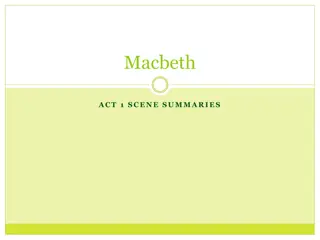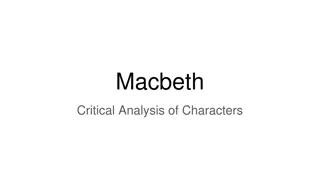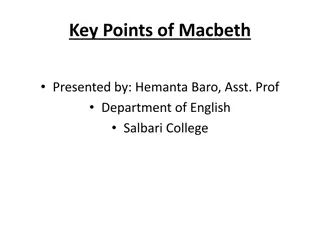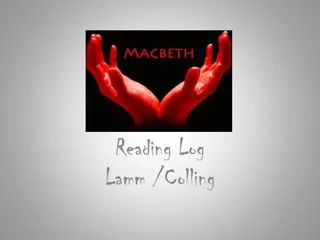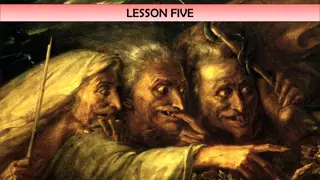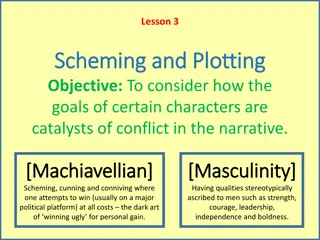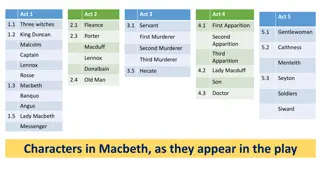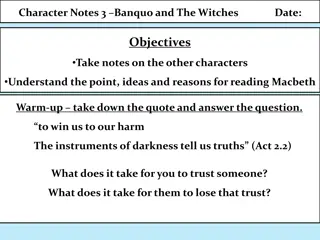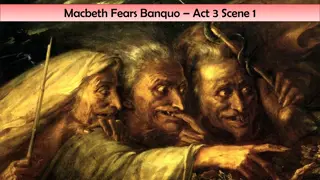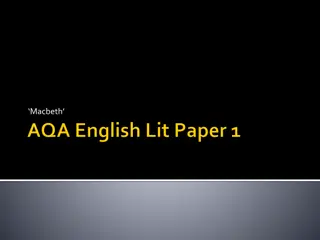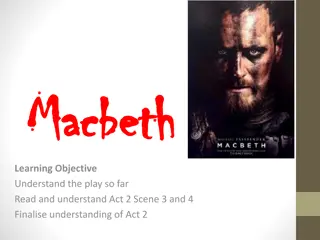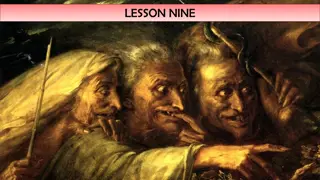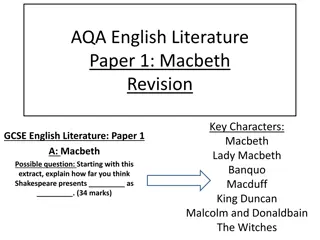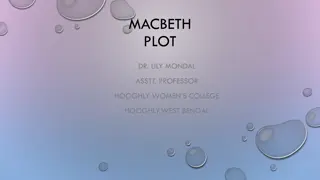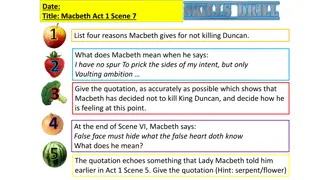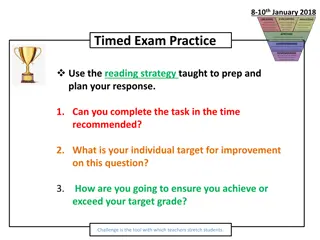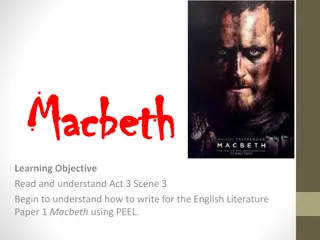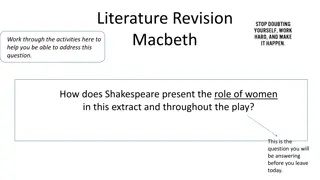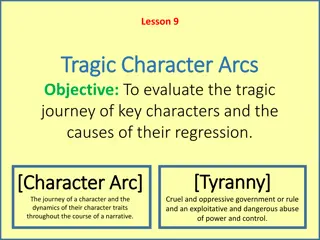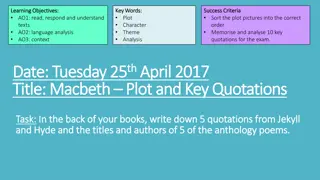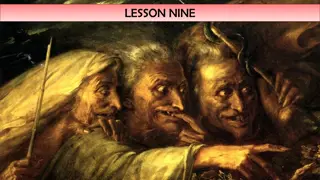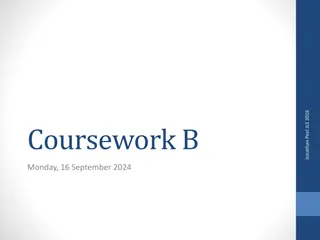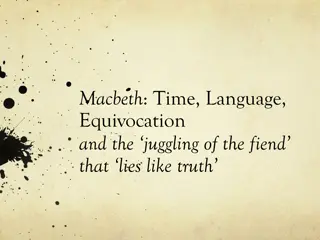Macbeth Comprehension Questions and Tragedy Context Analysis
Explore the themes and context of Shakespeare's Macbeth through comprehension questions and in-depth analysis, including discussions on James I's rule, the divine right to rule, the character of Banquo, Macbeth's tragic flaw, and more.
Download Presentation

Please find below an Image/Link to download the presentation.
The content on the website is provided AS IS for your information and personal use only. It may not be sold, licensed, or shared on other websites without obtaining consent from the author. Download presentation by click this link. If you encounter any issues during the download, it is possible that the publisher has removed the file from their server.
E N D
Presentation Transcript
Macbeth Comprehension Questions
Red = answers Blue = quotations Green = subject terminology
Tragedy and Context 1. List three reasons why people might have questioned James I s right to rule. 2. How did the mood of the country change from the reign of Elizabeth to the reign of James? 3. The divine right to rule / divine rights of kings was based on the theory that there is a natural or divine order in the world. Explain how this order is broken in Macbeth. 4. How does the earth respond to the death of Duncan? (Quotation) 5. How and why is the character of Banquo linked to James I? 6. Explain the peripeteia in Macbeth. 7. Why is Macbeth s death considered a tragic waste? 8. The tragic hero brings about their own downfall because of a fatal flaw in their personality. What is Macbeth s harmartia? 9. Name three terms for describing the structure of a play. (Posh for beginning, middle and end.) 10. The internal conflict suffered by the tragic hero is a huge moral dilemma. Describe what a moral dilemma is and explain Macbeth s.
1. List three reasons why people might have questioned James Is right to rule. 1. he was Scottish 2. was not a direct descendant 3. mother was Catholic. 2. How did the mood of the country change from the reign of Elizabeth to the reign of James? People went from being firm royalists to becoming fearful of the whims of James I. 3. The divine right to rule / divine rights of kings was based on the theory that there is a natural or divine order in the world. Explain how this order is broken in Macbeth. The divine/natural order is broken because Macbeth takes fate into his own hands and kills the monarch, who was selected by God. 4. How does the earth respond to the death of Duncan? (Quotation) earth was feverous and did shake description of the storm the night Duncan was murdered. 5. How and why is the character of Banquo linked to James I? Banquo is an ancestor of James I, his sons were not direct descendants of Duncan; however, it is prophesized that will become kings, like James I argued. 6. Explain the peripeteia in Macbeth. Macbeth and Lady Macbeth switch roles. After the death of Duncan, Macbeth becomes ruthless and Lady Macbeth is consumed by guilt. 7. Why is Macbeth s death considered a tragic waste? Because prior to the murder, he was a virtuous, high-ranking and honourable man. 8. The tragic hero brings about their own downfall because of a fatal flaw in their personality. What is Macbeth s harmartia? His ambition, his arrogance and succumbed to his wife s demands too easily (manipulated.) 9. Name three terms for describing the structure of a play. (Posh for beginning, middle and end.) Exposition, Climax and Denouement. 10. The internal conflict suffered by the tragic hero is a huge moral dilemma. Describe what a moral dilemma is and explain Macbeth s. Moral dilemma is a clash of values and Macbeth s clash of values are his loyalty to his king and to his wife. Or loyalty vs. ambition.
Act 1, Scenes 1 3 1. How is pathetic fallacy used in Act 1, Scene 1? 2. Explain the relevance of the quotation fair is foul and foul is fair ? 3. What technique is used in fair is foul and foul is fair ? 4. A captain tells Duncan about how Macbeth unsheathed his enemies from the knave to the chops . Recall another quotation for how Macbeth is described in Act 1, Scene 2. 5. What does Duncan learn about the Thane of Cawdor in Scene II? 6. What proclamation does Duncan make about the Thane of Cawdor and Macbeth? 7. Where is Macbeth already the Thane of? 8. In Act 1, Scene 3, when Banquo presses the witches for a prophecy, what do they tell him? Quotation required. 9. Who arrives to tell Macbeth that he has been named Thane of Cawdor? 10. After hearing he is Thane of Cawdor, Macbeth speaks of an suggestion that doth unfix [his] hair and make his seated heart knock at [his] ribs . What is this idea?
Act 1, Scenes 1 3 1. How is pathetic fallacy used in Act 1, Scene 1? Thunder creates an ominous and frightening atmosphere, reflective of the evil nature of the witches. 2. Explain the relevance of the quotation fair is foul and foul is fair ? Good and bad/right and wrong don t exist they are subjective concepts. 3. What technique is used in fair is foul and foul is fair ? Chiasmus is used. 4. A captain tells Duncan about how Macbeth unsheathed his enemies from the knave to the chops . Recall another quotation for how Macbeth is described in Act 1, Scene 2. brave Macbeth , noble gentleman , valiant , worthy cousin . 5. What does Duncan learn about the Thane of Cawdor in this scene? That the ToC betrayed Duncan. 6. What proclamation does Duncan make about the Thane of Cawdor and Macbeth? That ToC will be executed and Macbeth will become new ToC. 7. Where is Macbeth already the Thane of? Glamis. 8. In Act 1, Scene 3, when Banquo presses the witches for a prophecy, what do they tell him? Quotation required. thou shall get kings though thou be none , lesser than Macbeth but greater , not so happy, yet far happier . 9. Who arrives to tell Macbeth that he has been named Thane of Cawdor? Ross and Angus. 10. After hearing he is Thane of Cawdor, Macbeth speaks of an suggestion that doth unfix [his] hair and make his seated heart knock at [his] ribs . What is this idea? First thoughts of committing regicide.
Act 1, Scenes 4- 5 1. Malcolm states that the Thane of Cawdor died begging for Duncan s pardon and had deep repentance . Duncan says that he was a man in which he had built absolute trust . Why is this ironic? 2. In an aside to the audience, Macbeth states that Duncan s intention to name Malcolm as his heir is a step he must fall down or overleap . What does this mean? 3. Macbeth then says: stars hide your fires, let not light see my dark and deep desires . What does he mean by this? 4. Where does Duncan decide to go that night? 5. With what does Scene 5 open? 6. Why does Lady Macbeth worry about Macbeth? Recall a quotation. 7. Recall a quotation for Lady Macbeth summoning the supernatural. 8. What does Lady Macbeth mean by unsex me here ? 9. How does Macbeth greet Lady Macbeth? 10. Lady Macbeth tells Macbeth to look like the innocent flower but be the serpent under it. What does she mean by this metaphor?
Act 1, Scenes 4- 5 1. Malcolm states that the Thane of Cawdor died begging for Duncan s pardon and had deep repentance . Duncan says that he was a man in which he had built absolute trust . Why is this ironic? Because Macbeth is now ToC and is already also plotting to betray Duncan. 2. In an aside to the audience, Macbeth states that Duncan s intention to name Malcolm as his heir is a step he must fall down or overleap . What does this mean? That if Duncan is killed/dies then Malcolm would become king this is something that obstructs Macbeth s plan. Step is a metaphor for Malcolm. 3. Macbeth then says: stars hide your fires, let not light see my dark and deep desires . What does he mean by this? That he intends to hide these evil thoughts. The use of rhyming couplets reflects the Witches style of speech, thus hinting at evil plotting. 4. Where does Duncan decide to go that night? Macbeth s castle. 5. With what does Scene 5 open? Lady Macbeth reading a letter from Macbeth where he tells her about the encounter with the Witches. 6. Why does Lady Macbeth worry about Macbeth? Recall a quotation. without the ambition to attend it and I do fear thy nature is too full of the milk of human kindness . 7. Recall a quotation for Lady Macbeth summoning the supernatural. Come you spirits that tend on mortal thoughts 8. What does Lady Macbeth mean by unsex me here ? Take all femininity away and make her manly. 9. How does Macbeth greet Lady Macbeth? My dearest love 10. Lady Macbeth tells Macbeth to look like the innocent flower but be the serpent under it. What does she mean by this metaphor? Hide the evil thoughts. Appearance vs Reality/Deception.
Act 1, Scenes 6 7 1. In Act 1, Scene 6, Duncan arrives at Macbeth s castle and compliments Lady Macbeth. How is this an example of dramatic irony? 2. In Act 1, Scene 7, Macbeth delivers a very famous soliloquy in this scene where he deliberates over the grave consequences of regicide. Provide 2 quotations from this soliloquy. Clue.. I am his k_____ and his s_____ . 3. Why is Macbeth so concerned about the life to come ? 4. What does Macbeth mean by I have no spur to prick the sides of my intent, but only vaulting ambition that overleaps itself ? 5. Macbeth makes his mind up that he will not kill Duncan. How does Lady Macbeth respond? 6. We find out now that Lady Macbeth once had a child. Recall the quotation. Paraphrasing is acceptable. 7. How does Lady Macbeth emasculate Macbeth in this scene? 8. How does Lady Macbeth propose to carry out the murder of Duncan? Explain her plan. 9. Why does Macbeth tell Lady Macbeth to bring forth men children only ? 10. Macbeth s final line in the scene is false face must hide what the false heart doth know . Which key theme does this link to?
Act 1, Scenes 6 7 1. In Act 1, Scene 6, Duncan arrives at Macbeth s castle and compliments Lady Macbeth. How is this an example of dramatic irony? Because Duncan doesn t know LM s plan to become queen. In Act 1, Scene 7, Macbeth delivers a very famous soliloquy in this scene where he deliberates over the grave consequences of regicide. Provide 2 quotations from this soliloquy. Clue.. I am his k_____ and his s_____ . I am his kinsman and his subject / vaulting ambition / the life to come / deep damnation of his taking off Why is Macbeth so concerned about the life to come ? Because his eternal soul would be damned to hell forever. What does Macbeth mean by I have no spur to prick the sides of my intent, but only vaulting ambition that overleaps itself ? I have no desire/reason to carry out the murder it s only ambition that makes me think about it. Macbeth makes his mind up that he will not kill Duncan. How does Lady Macbeth respond? She says she feels betrayed, calls him a coward and asks him if he s drunk We find out now that Lady Macbeth once had a child. Recall the quotation. Paraphrasing is acceptable. I have given suck and know how tender tis to love the babe that milks me How does Lady Macbeth emasculate Macbeth in this scene? coward questions his masculinity How does Lady Macbeth propose to carry out the murder of Duncan? Explain her plan. Drug the guards and murder Duncan together frame the guards Why does Macbeth tell Lady Macbeth to bring forth men children only ? Because she is so manly and evil with strength to carry out terrible deeds women seen as weaker sex. Possible heir 10. Macbeth s final line in the scene is false face must hide what the false heart doth know . Which key theme does this link to? Appearance vs reality always the idea that something is hidden beneath the surface 2. 3. 4. 5. 6. 7. 8. 9.
Act 2, Scenes 1 2 1. Fleance and Banquo are talking at the beginning of Scene 1. Macbeth enters and lies to Banquo about something. What does he lie about? 2. Macbeth then begins his soliloquy is this a dagger I see before me . Summarise what ideas Macbeth explores in this soliloquy. 3. The bell rings and the soliloquy ends. What does the bell signal? 4. We do see the death of Duncan. Why does Shakespeare not describe the death/show it on stage? 5. In Scene 2, what reason does Lady Macbeth give for not killing Duncan herself? 6. When Macbeth returns with two bloody daggers he is frantically ranting about a dream where he couldn t say Amen when two others said God bless us . Why is Macbeth so troubled about not being able to say Amen ? 7. Macbeth also keeps repeating Macbeth shall sleep no more . What do you think this means? 8. Lady Macbeth pronounces Macbeth mad when she says infirm of purpose! . What actions does she then carry out? 9. When Macbeth laments about his guilt, he uses hyperbolic language about the ocean. Can you remember the quotation? 10. At the very end of Scene 2, they hear a knock at the door. What do Macbeth and Lady Macbeth do?
Act 2, Scenes 1 2 1. Fleance and Banquo are talking at the beginning of Scene 1. Macbeth enters and lies to Banquo about something. What does he lie about? I think not of them about the Witches when Banquo mentions that the weird sisters showed Macbeth some truth . Macbeth then begins his soliloquy is this a dagger I see before me . Summarise what ideas Macbeth explores in this soliloquy. Hallucinates heat oppressed brain , guilt, fear and contemplates the witches - at the end the bell rings his signal to kill Duncan The bell rings and the soliloquy ends. What does the bell signal? His call to murder Duncan We do see the death of Duncan. Why does Shakespeare not describe the death/show it on stage? Too horrifying for the audience would be seen as sacrilege In Scene 2, what reason does Lady Macbeth give for not killing Duncan herself? Duncan looked too much like her father When Macbeth returns with two bloody daggers he is frantically ranting about a dream where he couldn t say Amen when two others said God bless us . Why is Macbeth so troubled about not being able to say Amen ? Because he has damaged his eternal soul beyond repair through the act of regicide amen is a religious word no longer connected with God. Macbeth also keeps repeating Macbeth shall sleep no more . What do you think this means? He will never rest again/have peace reference to afterlife Lady Macbeth pronounces Macbeth mad when she says infirm of purpose! . What actions does she then carry out? Plants the daggers as Macbeth emerged from the chamber holding them When Macbeth laments about his guilt, he uses hyperbolic language about the ocean. Can you remember the quotation? 10. At the very end of Scene 2, they hear a knock at the door. What do Macbeth and Lady Macbeth do? Retire to their chamber and Macbeth shouts that he wishes the knocking would wake Duncan 2. 3. 4. 5. 6. 7. 8. 9.
Act 2, Scenes 3 4 1. The porter rambles about devils and drunkenness at the beginning of scene 3, how is his speech different to that of nobility? 2. Who discovers Duncan s body? 3. How does Lennox describe the weather of the night of the murder? Quotations please. 4. How does the use of pathetic fallacy link to the theme of the divine order? 5. How does Macduff describe Duncan s death? 6. When Macbeth explains that he killed the chamberlains, Lady Macbeth interrupts when she faints, saying help me hence, ho. Why did Lady Macbeth faint here? 7. Why do Malcolm go to England and Donalbain go to Ireland? 8. SC 4 Ross and an old man are talking outside Macbeth s castle. What do they discuss? 9. Who delivers news of Duncan s death and Macbeth s pending coronation to Ross and old man? 10. Who falls under suspicion for paying the chamberlains to orchestrate Duncan s death?
Act 2, Scenes 3 4 1. The porter rambles about devils and drunkenness at the beginning of scene 3, how is his speech different to that of nobility? Written in plain prose rather than blank verse 2. Who discovers Duncan s body? Macduff 3. How does Lennox describe the weather of the night of the murder? Quotations please. night was unruly earth was feverous and did shake strange screams of death [in the air] 4. How does the use of pathetic fallacy link to the theme of the divine order? Divine order is almost synonymous with divine order natural world responding in horror to the death of a divine figure 5. How does Macduff describe Duncan s death? Horror horror horror and most sacrilegious murder 6. When Macbeth explains that he killed the chamberlains, Lady Macbeth interrupts when she faints, saying help me hence, ho. Why did Lady Macbeth faint here? It s fake she pretends because Macbeth is talking too much 7. Why does Malcolm go to England and Donalbain go to Ireland? For safety 8. SC 4 Ross and an old man are talking outside Macbeth s castle. What do they discuss? Strange occurrences an owl killing a falcon and horses going crazy 9. Who delivers news of Duncan s death and Macbeth s pending coronation? Macduff 10. Who falls under suspicion for paying the chamberlains to orchestrate Duncan s death? Malcolm and Donalbain
Act 3, Scenes 1 2 1. In the beginning of scene I Banquo delivers a short soliloquy. What is the focus of this soliloquy? 2. After Banquo and the others exit, Macbeth delivers a very famous speech that begins with to be thus is nothing/but to be safely thus . What do these opening lines mean? 3. Why does Macbeth say that his fears in Banquo stick deep ? 4. Who does Macbeth plot to kill at the end of this scene? 5. Macbeth hires murderers to carry out these killings. What does this show about how Macbeth is changing? 6. In scene II, Lady Macbeth says Naught shad, all s spent , what does this mean? 7. Macbeth delivers a very famous speech that begins with we have scorched the snake, not killed it . To what is he referring? 8. When Macbeth reveals plans to murder Banquo, Lady Macbeth says You must leave this . At the end of the scene, Macbeth tells Lady Macbeth to be innocent of the knowledge dearest chuck . What tragedy term could we use to describe this moment? 9. Macbeth s closing speech he says come seeling night . What does this remind us of? 10. There is lots of animal imagery in this scene. Recall two examples.
Act 3, Scenes 1 2 1. In the beginning of scene I Banquo delivers a short soliloquy. What is the focus of this soliloquy? Thou hast it all now I fear thou playd most foully for it. 2. After Banquo and the others exit, Macbeth delivers a very famous speech that begins with to be thus is nothing/but to be safely thus . What do these opening lines mean? Being king is nothing unless the position is secure 3. Why does Macbeth say that his fears in Banquo stick deep ? Because Banquo s sons are to be kings according to the prophecy and realizes that Banquo suspects 4. Who does Macbeth plot to kill at the end of this scene? Banquo and Fleance 5. Macbeth hires murderers to carry out these killings. What does this show about how Macbeth is changing? Becoming more cowardly, morally weak because he won t carry out the acts himself. Murder is becoming normalized. 6. In scene II, Lady Macbeth says Naught shad, all s spent , what does this mean? Lady Macbeth feels that they still have nothing even though they are now royalty 7. Macbeth delivers a very famous speech that begins with we have scorched the snake, not killed it . To what is he referring? The job is only half done because Fleance is still alive 8. When Macbeth reveals plans to murder Banquo, Lady Macbeth says You must leave this . At the end of the scene, Macbeth tells Lady Macbeth to be innocent of the knowledge dearest chuck . What tragedy term could we use to describe this moment? Peripeteia because there is a role reversal as she was him to be innocent before 9. In Macbeth s closing speech he says come seeling night . What does this remind us of? When Lady Macbeth summons the supernatural Act 1,Sc5 she says come thick night 10. There is lots of animal imagery in this scene. Recall two examples. Snakes/Scorpions/Bats
Act 3, Scenes 3 4 1. Act 3, Scene 3 is only one page in length. What is the main event that takes place in this scene? 2. What does Banquo say to Fleance when instructing him to escape? Quotation required. 3. The third murderer says who did strike out the light . Why is this significant? 4. Scene 4, Upon hearing of Fleance s escape, Macbeth says there the grown serpent lies; the worm that s fled . How does this relate to imagery in earlier parts of the play? 5. During the banquet, as Macbeth criticizes Banquo for not attending the King s feast, the Ghost of Banquo appears. Where does the ghost sit and why is this significant? 6. Macbeth tells his guests: I have a strange infirmity which is nothing / To those that know me .What does this mean? 7. When the ghost reappears, Macbeth starts to shout at it. Does the Ghost of Banquo respond to anything Macbeth says? 8. After the guests leave, Macbeth speaks to Lady Macbeth. He says Blood will have blood. What does this mean? 9. Macbeth mentions to Lady Macbeth that he pays servants to spy in all of his thanes homes. Who is noticeably absent at the banquet and why is Macbeth worried? 10. Worried, Macbeth makes plans for the next day. Where does he say he will go in the morning?
Act 3, Scenes 3 4 1. Act 3, Scene 3 is only one page in length. What is the main event that takes place in this scene? Murderers kill Banquo but Fleance escapes What does Banquo say to Fleance when instructing him to escape? Quotation required. Fly, good Fleance, fly, fly, fly The third murderer says who did strike out the light . Why is this significant? Could be a metaphor - because the light could represent the Banquo family (connection to James I) Scene 4, Upon hearing of Fleance s escape, Macbeth says there the grown serpent lies; the worm that s fled . How does this relate to imagery in earlier parts of the play? Scotched the snake/innocent flower serpent under it snake is motif representing eveil plan/problem During the banquet, as Macbeth criticizes Banquo for not attending the King s feast, the Ghost of Banquo appears. Where does the ghost sit and why is this significant? Sits in Macbeth s chair as according to divine order/rights, Banquo s family have more right to sit in that chair Macbeth tells his guests: I have a strange infirmity which is nothing / To those that know me .What does this mean? I have a disability that prompts these seizures reassuring the guests that he is sane When the ghost reappears, Macbeth starts to shout at it. Does the Ghost of Banquo respond in dialogue to anything Macbeth says? No After the guests leave, Macbeth speaks to Lady Macbeth. He says Blood will have blood. What does this mean? Means that Banquo is avenging his own death by coming to haunt Macbeth Macbeth mentions to Lady Macbeth that he pays servants to spy in all of his thanes homes. Who is noticeably absent at the banquet and why is Macbeth worried? Macduff is absent and his servants have tipped Macbeth off that Macduff is suspicious 10. Worried, Macbeth makes plans for the next day. Where does he say he will go in the morning? To see the Witches for more information 2. 3. 4. 5. 6. 7. 8. 9.
Act 3, Scenes 5 6 1. What is the name of the witch that reprimands the weird sisters for meddling too much in Macbeth s affairs? 2. What is the main reason that many people think this scene was not actually written by Shakespeare? 3. Is Scene 5 in any way relevant to the development of the plot? 4. Scene 6 - Lennox and a Lord are the only characters. They speak privately about how Macbeth has become a t 5. Why do Lennox and the Lord suspect Macbeth? 6. Why has Macduff gone to England?
Act 3, Scenes 5 6 1. What is the name of the witch that reprimands the weird sisters for meddling too much in Macbeth s affairs? Hecates 2. What is the main reason that many people think this scene was not actually written by Shakespeare? Because there is singing and dancing in the scene 3. Is Scene 5 in any way relevant to the development of the plot? No 4. Scene 6 - Lennox and a Lord are the only characters. They speak privately about how Macbeth has become a t tyrant 5. Why do Lennox and the Lord suspect Macbeth? 1. because Macbeth benefitted from the deaths 2. Macbeth didn t appear to grieve the deaths/moved on too quickly 6. Why has Macduff gone to England? To meet Malcolm and King Edward (the Confessor) and to plot to usurp Macbeth, reclaiming the throne for Malcolm. Basically to plan a war.
Act 4, Scene 1 1. How does Act 4 Scene 1 open? What is taking place? 2. With the Witches next prophecy, an apparition appears with each of the three parts. What is the first prediction and apparition? 3. What is the second prediction and apparition? 4. What is the third prediction and apparition? 5. Macbeth is warned against asking further questions, but does so anyway. He asks shall Banquo s issue ever reign in this kingdom . What do the witches show him in response? 6. There is a clear reference to James I in the vision presented by the witches. Can you explain what it is? 7. When Lennox enters, what news does he arrive with? 8. Why does Macbeth begin to feel safe again? 9. Macbeth says that, from now on, this is his philosophy: "From this moment / The very firstlings of my heart shall be / The firstlings of my hand." What do you think this means? 10. What does Macbeth resolve to do next?
Act 4, Scene 1 1. How does Act 4 Scene 1 open? What is taking place? Witches are being stereotypical witches and are brewing something in cauldron 2. With the Witches next prophecy, an apparition appears with each of the three parts. What is the first prediction and apparition? Beware the Thane of Fife and an apparition appears from the cauldron of a severed head. 3. What is the second prediction and apparition? None of woman born shall harm Macbeth said by a bloody child. 4. What is the third prediction and apparition? Til Birnam Wood come to high Dunsinane said by child in a crown holding tree branches. 5. Macbeth is warned against asking further questions, but does so anyway. He asks shall Banquo s issue ever reign in this kingdom . What do the witches show him in response? A line of 8 kings and Banquo s ghost the kings resemble Banquo 6. There is a clear reference to James I in the vision presented by the witches. Can you explain what it is? The King at the end of the line is holding two orbs James I was coronated he held 2 orbs to represent England and Scotland shows it was fate he would be King of England Divine right question etc 7. When Lennox enters, what news does he arrive with? Macduff has gone to England 8. Why does Macbeth begin to feel safe again? Woman born no one can kill him 9. Macbeth says that, from now on, this is his philosophy: "From this moment / The very firstlings of my heart shall be / The firstlings of my hand." What do you think this means? He will act upon impulse only and will not consider the consequences of his actions 10. What does Macbeth resolve to do next? Plans to get Macduff s family (and Macduff)
Act 4, Scene 2-3 1. Act 4 scene 2 opens with the news that Macduff has fled Scotland for England. Why does Lady Macduff think Macduff has fled? Ross responds with you know not/whether it was his wisdom or his fear . What does this mean? Act 4 scene 2 is primarily a playful conversation between Lady Macduff and her young son. Think about Lady Macbeth now. What dramatic technique has Shakespeare used with these two characters? A messenger arrives what does he inform Lady Macduff? How does the scene end? Act 4 scene 3 opens outside King Edward s castle with a conversation between Malcolm and Macduff. Malcolm is testing Macduff. Why does he test him? Regarding Macbeth, Macduff says not in the legions of horrid hell can come a devil more damned in evils to top Macbeth . Can you recall any other words used to describe Macbeth in this scene? Malcolm explains to Macduff that King Edward, a true King, has a heavenly gift to cure disease. How does this relate to James I? Ross enters and explains that Macduff s wife and children have been killed. Malcolm tells Macduff: Dispute it like a man Macduff answers, I shall do so, / But I must also feel it as a man . What does this show us about Macduff? 10. Can you remember the very famous quotation from Macduff to describe his family all my pretty 2. 3. 4. 5. 6. 7. 8. 9.
Act 4, Scene 2-3 1. Act 4 scene 2 Macduff s castle - opens with the news that Macduff has fled Scotland for England. Why does Lady Macduff think Macduff has fled? She thinks he is a traitor to Macbeth Ross responds with you know not/whether it was his wisdom or his fear . What does this mean? She does not know why Macduff has left don t be angry with him Act 4 scene 2 is primarily a playful conversation between Lady Macduff and her young son. Think about Lady Macbeth now. What dramatic technique has Shakespeare used with these two characters? Dramatic foils characters that contrast each other to emphasise characteristics A messenger arrives what does he inform Lady Macduff? Tells her to flee as danger is approaching How does the scene end? Lady Macduff and kids are murdered by people Macbeth hired. Act 4 scene 3 opens outside King Edward s castle with a conversation between Malcolm and Macduff. Malcolm is testing Macduff. Why does he test him? To test his loyalty as he suspects Macduff may be working for Macbeth Regarding Macbeth, Macduff says not in the legions of horrid hell can come a devil more damned in evils to top Macbeth . Can you recall any other words used to describe Macbeth in this scene? devil , tyrant , smacking of every sin , malicious , deceitful Malcolm explains to Macduff that King Edward, a true King, has a heavenly gift to cure disease. How does this relate to James I? James I claimed to have Christ-like powers of healing because he was chosen by God. Showing deference to James I. Ross enters and explains that Macduff s wife and children have been killed. Malcolm tells Macduff: Dispute it like a man Macduff answers, I shall do so, / But I must also feel it as a man . What does this show us about Macduff? That he is sensitive and compassionate he is ruled by his heart and is not threatened by ideas of masculinity 10. Can you remember the very famous quotation from Macduff to describe his family all my pretty chickens! In one fell swoop 2. 3. 4. 5. 6. 7. 8. 9.
Act 5, Scene 1-5 1. Act 5, Scene 1 features Lady Macbeth, a Doctor and a Gentlewoman. Lady Macbeth has gone mad. How has her speech changed in this scene? 2. Recall three quotations from Lady Macbeth in this scene. 3. How do you interpret Lady Macbeth s final words: to bed, to bed, to bed 4. A group of Scottish lords meet in Act 5, Scene 2. Where do they plan to bring their armies? 5. In Act 5, Scene 3, Macbeth hears that 10,000 soldiers are on their way to his castle. How does Macbeth respond? 6. In Act 5, Scene 3, the Doctor tells Macbeth about Lady Macbeth s condition. Doc says she is troubled with thick coming fancies . What does this mean? 7. Act 5, Scene 4 returns to the plans of the Scottish Lords for how to attack. What plan do they form? 8. Act 5, Scene 5. Lady Macbeth has died. How does Macbeth find out that Lady Macbeth has died? 9. Beginning of a very famous speech from Macbeth she should have died hereafter . What does this mean? 10. Life s but a walking shadow, a poor player that struts and frets his hour on the stage and then is heard no more. It is a tale told by an idiot, full of sound and fury, signifying nothing. What are Macbeth s thoughts about life and death in this passage?
Act 5, Scene 1-5 1. Act 5, Scene 1 features Lady Macbeth, a Doctor and a Gentlewoman. Lady Macbeth has gone mad. How has her speech changed in this scene? Now speaks in broken prose, used to speak in iambic pentameter to show sanity/control Recall three quotations from Lady Macbeth in this scene. wash your hands , out damned spot, out I say will all the perfumes of Arabia sweeten this little hand , the thane of fife had a wife, where is she now How do you interpret Lady Macbeth s final words: to bed, to bed, to bed euphemism for death? Thinks she s talking to Macbeth? A child? A group of Scottish lords meet in Act 5, Scene 2. Where do they plan to bring their armies? Birnam Wood In Act 5, Scene 3, Macbeth hears that 10,000 soldiers are on their way to his castle. How does Macbeth respond? Feels quite safe repeats prophecies puts armour on just in case In Act 5, Scene 3, the Doctor tells Macbeth about Lady Macbeth s condition. Doc says she is troubled with thick coming fancies . What does this mean? She s getting worse hallucinating a lot Act 5, Scene 4 returns to the plans of the Scottish Lords for how to attack. What plan do they form? Disguise the army using branches of trees from Birnam Wood wood is on the move Act 5, Scene 5. Lady Macbeth has died. How does Macbeth find out that Lady Macbeth has died? Hears women screaming Beginning of a very famous speech from Macbeth she should have died hereafter . What does this mean? She would have died anyway 10. Life s but a walking shadow, a poor player that struts and frets his hour on the stage and then is heard no more. It is a tale told by an idiot, full of sound and fury, signifying nothing. What are Macbeth s thoughts about life and death in this passage? 2. 3. 4. 5. 6. 7. 8. 9.
Act 5, Scene 5-10 1. In Act 5, Scene 6 the army arrive outside Dunsinane. In Act 5, Scene 7, who enters, challenges Macbeth and is promptly slain? 2. In Act 5, Scene 8 Macduff enters. Recall the quotation for Macduff informing Macbeth that he was not of woman born. 3. How does Macduff exit this scene? 4. In Act 5, Scene 9, Macduff enters holding what? 5. Who is crowned king in this scene? 6. Macbeth and Lady Macbeth described by Malcolm in this final scene as dead butcher and fiend like queen . How is this an example of tragic waste? 7. How does the ending of Macbeth satisfy tragic elements?
Act 5, Scene 5-10 1. In Act 5, Scene 6 the army arrive outside Dunsinane. In Act 5, Scene 7, who enters, challenges Macbeth and is promptly slain? Young Siward 2. In Act 5, Scene 8 Macduff enters. Recall the quotation for Macduff informing Macbeth that he was not of woman born. untimely ripp d 3. How does Macduff exit this scene? Carrying Macbeth s dead body after killing him. 4. In Act 5, Scene 9, Macduff enters parading what part of Macbeth s anatomy? Head 5. Who is crowned king after Macbeth s murder? Malcolm 6. Macbeth and Lady Macbeth are described by Malcolm in this final speech as dead butcher and fiend like-queen . How is this an example of tragic waste? Because they were sophisticated, high ranking, noble people to begin with all of these talents/attributes were lost in the pursuit of power. 7. How does the ending of Macbeth satisfy the tragic structure? Protagonist died his actions have led to his death his death was inevitable. Order is restored.
Q1 An Inspector Calls 45 minutes 34 marks ONLY SPAG Q2 studied poetry comparison 45 minutes and 30 marks Q3 unseen poem response 24 marks 30 minutes Q4 unseen comparison 8 marks 10 minutes +9696
It is a most miserable thing to feel ashamed of home. There may be black ingratitude in the thing, and the punishment may be retributive and well deserved; but, that it is a miserable thing, I can testify. Home had never been a very pleasant place to me, because of my sister's temper. But, Joe had sanctified it, and I had believed in it. I had believed in the best parlour as a most elegant saloon; I had believed in the front door, as a mysterious portal of the Temple of State whose solemn opening was attended with a sacrifice of roast fowls; I had believed in the kitchen as a chaste though not magnificent apartment; I had believed in the forge as the glowing road to manhood and independence. Within a single year, all this was changed. Now, it was all coarse and common, and I would not have had Miss Havisham and Estella see it on any account. How much of my ungracious condition of mind may have been my own fault, how much Miss Havisham's, how much my sister's, is now of no moment to me or to any one. The change was made in me; the thing was done. Well or ill done, excusably or inexcusably, it was done. Once, it had seemed to me that when I should at last roll up my shirt-sleeves and go into the forge, Joe's 'prentice, I should be distinguished and happy. Now the reality was in my hold, I only felt that I was dusty with the dust of small coal, and that I had a weight upon my daily remembrance to which the anvil was a feather. There have been occasions in my later life (I suppose as in most lives) when I have felt for a time as if a thick curtain had fallen on all its interest and romance, to shut me out from anything save dull endurance any more. Never has that curtain dropped so heavy and blank, as when my way in life lay stretched out straight before me through the newly-entered road of apprenticeship to Joe.
Starting with this extract, explain how far you think Dickens presents Miss Havisham as unstable. (Chapter 49) She turned her face to me for the first time since she had averted it, and, to my amazement, I may even add to my terror, dropped on her knees at my feet; with her folded hands raised to me in the manner in which, when her poor heart was young and fresh and whole, they must often have been raised to heaven from her mother's side. To see her with her white hair and her worn face kneeling at my feet, gave me a shock through all my frame. I entreated her to rise, and got my arms about her to help her up; but she only pressed that hand of mine which was nearest to her grasp, and hung her head over it and wept. I had never seen her shed a tear before, and, in the hope that the relief might do her good, I bent over her without speaking. She was not kneeling now, but was down upon the ground. "O!" she cried, despairingly. "What have I done! What have I done!"
Starting with this extract, write about how Dickens presents Joe as a humble and kind character. The extract depicts Joe s words to Pip as he leaves London after his short visit to see Pip. "Pip, dear old chap, life is made of ever so many partings welded together, as I may say, and one man's a blacksmith, and one's a whitesmith, and one's a goldsmith, and one's a coppersmith. Diwisions among such must come, and must be met as they come. If there's been any fault at all to-day, it's mine. You and me is not two figures to be together in London; nor yet anywheres else but what is private, and beknown, and understood among friends. It ain't that I am proud, but that I want to be right, as you shall never see me no more in these clothes. I'm wrong in these clothes. I'm wrong out of the forge, the kitchen, or off th' meshes. You won't find half so much fault in me if you think of me in my forge dress, with my hammer in my hand, or even my pipe. You won't find half so much fault in me if, supposing as you should ever wish to see me, you come and put your head in at the forge window and see Joe the blacksmith, there, at the old anvil, in the old burnt apron, sticking to the old work. I'm awful dull, but I hope I've beat out something nigh the rights of this at last. And so GOD bless you, dear old Pip, old chap, GOD bless you!" I had not been mistaken in my fancy that there was a simple dignity in him. The fashion of his dress could no more come in its way when he spoke these words than it could come in its way in Heaven. He touched me gently on the forehead, and went out. As soon as I could recover myself sufficiently, I hurried out after him and looked for him in the neighboring streets; but he was gone.


